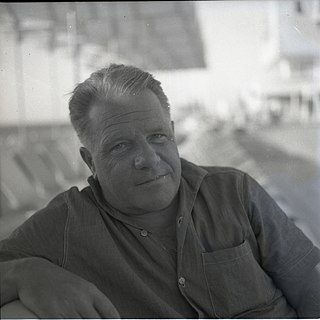
Lawrence George Durrell was an expatriate British novelist, poet, dramatist, and travel writer. He was the eldest brother of naturalist and writer Gerald Durrell.
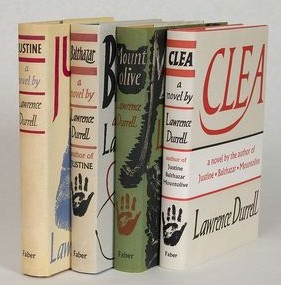
The Alexandria Quartet is a tetralogy of novels by British writer Lawrence Durrell, published between 1957 and 1960. A critical and commercial success, the first three books present three perspectives on a single set of events and characters in Alexandria, Egypt, before and during the Second World War. The fourth book is set six years later.

Konstantinos Petrou Kavafis, known, especially in English, as Constantine P. Cavafy and often published as C. P. Cavafy, was a Greek poet, journalist, and civil servant from Alexandria. A major figure of modern Greek literature, he is sometimes considered the most distinguished Greek poet of the 20th century. His works and consciously individual style earned him a place among the most important contributors not only to Greek poetry, but to Western poetry as a whole.
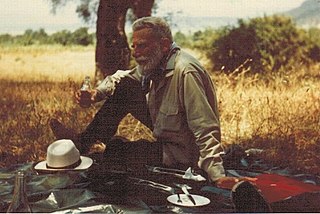
Theodore Philip Stephanides was a Greek-British doctor and polymath, best remembered as the friend and mentor of Gerald Durrell. He was also known as a naturalist, biologist, astronomer, poet, writer and translator.

Justine, published in 1957, is the first volume in Lawrence Durrell's literary tetralogy, The Alexandria Quartet. The tetralogy consists of four interlocking novels, each of which recounts various aspects of a complex story of passion and deception from differing points of view. The quartet is set in the Egyptian city of Alexandria in the 1930s and 1940s. The city itself is described by Durrell as becoming as much of a complex character as the human protagonists of the novels. Since first becoming available to the public and reviewers in 1957, Justine has inspired what has been called "an almost religious devotion among readers and critics alike." It was adapted into the film of the same name in 1969.

Clea, published in 1960, is the fourth volume in The Alexandria Quartet of novels by the British author Lawrence Durrell. Set in Alexandria, Egypt, in the 1930s and 1940s, the first three volumes tell the same story from different points of view, and Clea relates subsequent events.

Loxwood is a small village and civil parish with several outlying settlements, in the Chichester district of West Sussex, England, within the Low Weald. The Wey and Arun Canal passes to the East and South of the village. This Civil Parish is at the centre of an excellent network of bridleways and footpaths crossing the Low Weald and joining with those in adjacent Counties.

Monsieur, or The Prince of Darkness (1974), is the first volume in Lawrence Durrell's The Avignon Quintet. Published from 1974 to 1985, this sequence of five interrelated novels explore the lives of a group of Europeans before, during, and after World War II. Durrell uses many of the experimental techniques of metafiction that he had integrated into his Alexandria Quartet, published 1957 to 1960. He described the later quintet as a quincunx.
The Avignon Quintet is a five-volume series of novels by British writer Lawrence Durrell, published between 1974 and 1985. The novels are metafictional. He uses developments in experimental fiction that followed his The Alexandria Quartet (1957-1960). The action of the novels is set before and during World War II, largely in France, Egypt, and Switzerland.
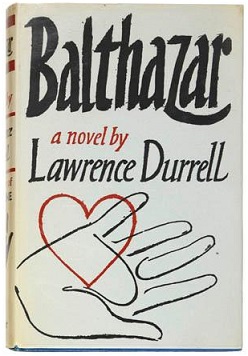
Balthazar, published in 1958, is the second volume in The Alexandria Quartet series by British author Lawrence Durrell. Set in Alexandria, Egypt, around World War II, the four novels tell essentially the same story from different points of view and come to a conclusion in Clea. Balthazar is the first novel in the series that presents a competing narrator, Balthazar, who writes back to the narrating Darley in his "great interlinear".

Mountolive, published in 1958, is the third volume in The Alexandria Quartet series by British author Lawrence Durrell. Set in Alexandria, Egypt, around World War II, the four novels tell essentially the same story from different points of view and come to a conclusion in Clea.Mountolive is the only third person narrative in the series, and it is also the most overtly political.

The Black Book is a novel by Lawrence Durrell, published in 1938 by the Obelisk Press.

Livia, or Buried Alive (1978), is the second volume in British author Lawrence Durrell's The Avignon Quintet, published from 1974 to 1985. Durrell has described the novels as "roped together like climbers on a rockface, but all independent. .. a series of books through which the same characters move for all the world as if to illustrate the notion of reincarnation." The description of this form for the quintet actually appears in Livia. The first novel of the quincunx, Monsieur, received the James Tait Black Memorial Prize in 1974.

Constance, or Solitary Practices is the central volume of the five novels of Lawrence Durrell's The Avignon Quintet, published from 1974 to 1985. It was nominated for the Booker Prize in 1982. Involving some of the characters from the preceding Livia, the novel also introduces new ones. It is set before and during World War II, in France, Egypt, Poland and Switzerland.
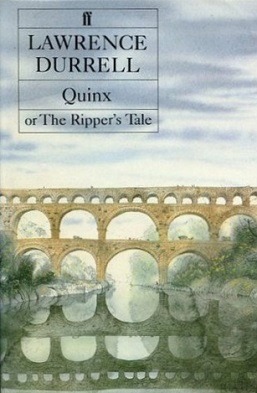
Quinx, or The Ripper's Tale is the 5th and final volume in Lawrence Durrell's "quincunx" of novels, The Avignon Quintet, published from 1974 to 1985. It explores the activities of Constance, Aubrey Blanford, Robin Sutcliffe, Lord Galen, and most of the other surviving characters as they return to Avignon and Provence in the immediate aftermath of World War II.
A pentalogy is a compound literary or narrative work that is explicitly divided into five parts. Although modern use of the word implies both that the parts are reasonably self-contained and that the structure was intended by the author, historically, neither was necessarily true: in fact, a pentalogia could be assembled by a later editor, just as Plotinus's Enneads were arranged in nines by Porphyry in order to create an overarching structure of six which would express the idea of perfection.
Quantum fiction is a genre of speculative fiction that reflects modern experience of the material world and reality as influenced by quantum theory and new principles in quantum physics. It is characterized by the use of an element in quantum mechanics as a storytelling device. The genre is not necessarily science-themed, and blurs the line separating science fiction and fantasy into a broad scope of mainstream literature that transcends the mechanical model of science and involves the fantasy of human perception or imagination as realistic components affecting the everyday physical world.
Henry Robin Romilly Fedden, CBE was an English writer, diplomat and mountaineer. He was the son of artist Romilly Fedden and novelist Katherine Waldo Douglas.
Richard Leslie Beswetherick Pine is the author of critical works on the Irish playwright Brian Friel, the Anglo-Irish novelist Lawrence Durrell, and aspects of art music in Ireland. He worked for the Irish national broadcaster RTÉ Raidió Teilifís Éireann before moving to Greece in 2001 to found the Durrell School of Corfu, which he directed until 2010. From 2009 to 2020 he wrote a regular column on Greek affairs in The Irish Times and was also an obituarist for The Guardian.














